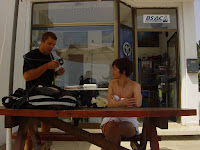 When we book onto our very first Scuba Diving Course, we realise that there will be a lot to learn. Although, there is a lot of information passed over on that first diving course, it is extremely difficult to absorb everything over the 3-5 days that you get for most introductory diving courses.
When we book onto our very first Scuba Diving Course, we realise that there will be a lot to learn. Although, there is a lot of information passed over on that first diving course, it is extremely difficult to absorb everything over the 3-5 days that you get for most introductory diving courses.Much of the information that you really need comes after the course when you start actually diving.
When you begin to put all that initial training in to practice, things begin to make more sense and you gradually begin to see how all the pieces of the puzzle fit together.
What happens next can take a number of different avenues. There are some that will not dive again after gaining the initial certification and there are those that will go out and dive for a while but then stop citing reasons like "it just didn't interest me anymore!"
This is where Continuing education for Scuba Divers comes in.
Scuba Diving is such a diverse sport that there is literally a side of it that appeals to everyone. You can learn Underwater Photography or Video, which is becoming more popular these days with the advent of the affordable GoPro cameras. Night Diving and now, flouro night diving offers a new perspective on regular diving with lots of different creatures and critters that you just do not see during day dives. Open up cooler climes by learning to dive in a dry suit and the cold will not be a limiting factor for your Scuba.
The beauty of these branches of Scuba Diving (and many others) is that you do not need to take a formal course to learn how to use them. However, use common sense. Practice good buoyancy skills before you start to play with cameras underwater and, if you have never been night diving before, dive with somebody who has experience that can help you, make sure you know the dive site well and keep your routes simple for easy navigation.
Other areas of scuba do require formal training and these can include Technical Diving or Cave Diving and even reaching a professional rating so you can guide and teach others.
Every diver I take in the water teaches me something new. Whether it is an Open Water Course or a guided dive with Tech Divers, if you listen and watch, you can learn every day. There are multiple diving agencies out there and they all have their own twists and tweaks to make the courses, skills and diving slightly different and if you keep an open mind, it is possible to cherry pick those things that will work for you in your diving.
As an instructor, I think continuing to learn and grow your diving and knowledge base is even more important. The world of Scuba is continually evolving. New techniques and equipment are released all the time and it is imperative that you stay up to date and maintain the flexibility to adapt to better diving systems and ways of diving.



Great read! Back to school is not simply an educational process in regard to the scuba diving rather it is a security and self-assured outing underwater. The sea is unpredictable and keeping in touch with new methods can actually help a lot when someone asks to write my dissertation for me or I need expert assistance I do believe in being able to learn how to dive in a smarter and safer way by learning it with professionals.
ReplyDelete